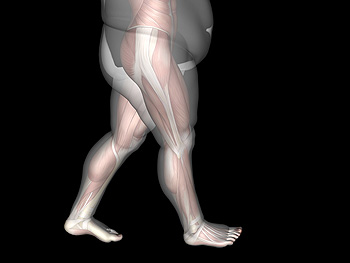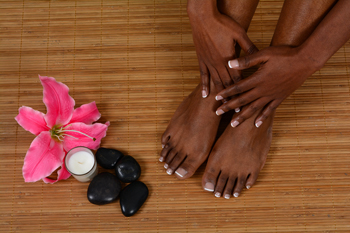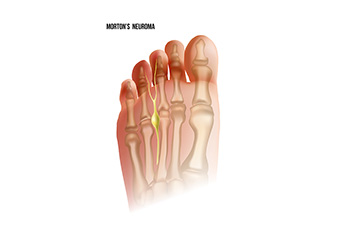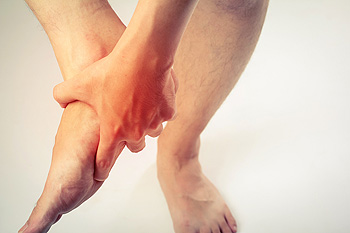Items filtered by date: July 2023
The Connection Between Obesity and Falls in the Elderly

As we age, our physical abilities naturally decline, making us more susceptible to falls. This vulnerability is amplified in the elderly population due to age-related factors such as loss of skeletal muscle mass and strength, as well as the prevalence of various medical conditions. However, it is important to note that obesity further exacerbates the issue, as individuals carrying excess weight often struggle with balance and face a higher risk of falling. This risk is particularly pronounced among elderly individuals who are obese. The combination of obesity and age-related factors creates a perfect storm for increased fall risk, as it leads to compromised balance, decreased lower limb strength, and impaired postural stability. If you are elderly and carry excess weight, it is suggested that you make an appointment with a podiatrist for guidance on fall prevention strategies.
Obesity has become very problematic at this point in time and can have extremely negative effects on the feet. If you’re an obese individual and are concerned about your feet, contact one of our podiatrists from Nashville Family Foot Care. Our practitioners can provide the care you need to keep you pain-free and on your feet.
Obesity and Your Feet
Since your feet are what support your entire weight when standing, any additional weight can result in pain and swelling. Being overweight is one of the main contributors to foot complications.
Problems & Complications
Extra Weight – Even putting on just a few extra pounds could create serious complications for your feet. As your weight increases, your balance and body will shift, creating new stresses on your feet. This uneven weight distribution can cause pain, even while doing the simplest tasks, such as walking.
Diabetes – People who are overweight are at serious risk of developing type-2 diabetes, which has a drastic impact on the health of your feet. As you get older, your diabetes might worsen, which could lead to loss of feeling in your feet, sores, and bruises. You could also become more prone to various infections.
Plantar fasciitis – Pressure and stress that is placed on muscles, joints, and tendons can trigger plantar fasciitis, which is an inflammation of tissue that forms along the bottom of the foot.
If you have any questions please feel free to contact our office located in Nashville, TN . We offer the newest diagnostic and treatment technologies for all your foot and ankle needs.
Are You Suffering From Nerve Damage?
Stretches and Moisturizing the Feet

Many foot conditions can be avoided when everyday foot care routines are practiced. These can consist of wearing shoes that fit correctly, and ensuring there is adequate room for the toes to move freely in. It is beneficial to avoid wearing high heels which may help to prevent painful conditions such as Morton’s neuroma and bunions from developing. Additionally, it is helpful to begin the day by washing and drying the feet thoroughly, followed by applying a good moisturizer. Trimming the toenails straight across while leaving the nail slightly longer than the tips of the toes may help to prevent an ingrown toenail from forming. Many people enjoy stretching their feet. A popular massaging stretch can be done by rolling the sole of the foot on a tennis ball, which may help to maintain proper circulation. If you would like more information about everyday foot care practices, it is suggested that you consult with a podiatrist who can provide you with useful information.
Everyday foot care is very important to prevent infection and other foot ailments. If you need your feet checked, contact one of our podiatrists from Nashville Family Foot Care. Our practitioners can provide the care you need to keep you pain-free and on your feet.
Everyday Foot Care
Often, people take care of their bodies, face and hair more so than they do for their feet. But the feet are a very important aspect of our bodies, and one that we should pay more attention to. Without our feet, we would not be able to perform most daily tasks.
It is best to check your feet regularly to make sure there are no new bruises or cuts that you may not have noticed before. For dry feet, moisturizer can easily be a remedy and can be applied as often as necessary to the affected areas. Wearing shoes that fit well can also help you maintain good foot health, as well as making it easier to walk and do daily activities without the stress or pain of ill-fitting shoes, high heels, or even flip flops. Wearing clean socks with closed shoes is important to ensure that sweat and bacteria do not accumulate within the shoe. Clean socks help to prevent Athlete’s foot, fungi problems, bad odors, and can absorb sweat.
If you have any questions please feel free to contact our office located in Nashville, TN . We offer the newest diagnostic and treatment technologies for all your foot and ankle needs.
A Compressed Foot Nerve May Indicate Morton’s Neuroma

Foot pain is a common ailment. It can happen in different areas of the foot and for various reasons. Pain that occurs between the third and fourth toes may indicate Morton’s neuroma has developed. It is a condition that affects the nerve between these toes and causes it to become compressed and irritated. Morton’s neuroma is generally caused by wearing shoes that do not have enough room in the toe area, such as high heels. It is beneficial to choose a shoe with a wider toe box if high heels are desired to be worn. Common symptoms that are associated with Morton’s neuroma can consist of a burning or tingling sensation, and many people feel as if there is a small pebble in their shoe or sock. Relief may be found in the beginning stages of Morton’s neuroma by wearing shoes that fit correctly. For progressed cases, it may be necessary for a more invasive treatment to be performed. If you have pain in this part of your foot, it is suggested that you seek the counsel of a podiatrist who can effectively diagnose and offer correct treatment options for Morton’s neuroma.
Morton’s neuroma is a very uncomfortable condition to live with. If you think you have Morton’s neuroma, contact one of our podiatrists of Nashville Family Foot Care. Our practitioners will attend to all of your foot care needs and answer any of your related questions.
Morton’s Neuroma
Morton's neuroma is a painful foot condition that commonly affects the areas between the second and third or third and fourth toe, although other areas of the foot are also susceptible. Morton’s neuroma is caused by an inflamed nerve in the foot that is being squeezed and aggravated by surrounding bones.
What Increases the Chances of Having Morton’s Neuroma?
- Ill-fitting high heels or shoes that add pressure to the toe or foot
- Jogging, running or any sport that involves constant impact to the foot
- Flat feet, bunions, and any other foot deformities
Morton’s neuroma is a very treatable condition. Orthotics and shoe inserts can often be used to alleviate the pain on the forefront of the feet. In more severe cases, corticosteroids can also be prescribed. In order to figure out the best treatment for your neuroma, it’s recommended to seek the care of a podiatrist who can diagnose your condition and provide different treatment options.
If you have any questions, please feel free to contact our office located in Nashville, TN . We offer the newest diagnostic and treatment technologies for all your foot care needs.
Common Signs of Plantar Fasciitis

Plantar fasciitis, an inflammation of the tissue that runs along the bottom of the foot, is one of the most common sources of foot and heel pain. One symptom of this condition is feeling pain after a period of rest, such as sleeping or a long car ride. Pain in the arch of the foot, swollen heels, and persistent heel pain are other symptoms. About 80 percent of people who have plantar fasciitis can also experience tightness in the Achilles tendon at the back of the heel. Furthermore, plantar fasciitis may affect the toes, ankles, and calf muscles, but these symptoms can be indirect results of the inflammation of the plantar fascia ligament. Active men and women between the ages of 40 and 70 are more at risk of developing plantar fasciitis. Taking certain medications, performing stretching exercises, and making changes to activity levels are believed to be helpful in relieving the pain of plantar fasciitis. If you need help with managing this condition, it is suggested that you make an appointment with a podiatrist for a diagnosis and appropriate treatment options.
Plantar fasciitis is a common foot condition that is often caused by a strain injury. If you are experiencing heel pain or symptoms of plantar fasciitis, contact one of our podiatrists from Nashville Family Foot Care. Our practitioners can provide the care you need to keep you pain-free and on your feet.
What Is Plantar Fasciitis?
Plantar fasciitis is one of the most common causes of heel pain. The plantar fascia is a ligament that connects your heel to the front of your foot. When this ligament becomes inflamed, plantar fasciitis is the result. If you have plantar fasciitis you will have a stabbing pain that usually occurs with your first steps in the morning. As the day progresses and you walk around more, this pain will start to disappear, but it will return after long periods of standing or sitting.
What Causes Plantar Fasciitis?
- Excessive running
- Having high arches in your feet
- Other foot issues such as flat feet
- Pregnancy (due to the sudden weight gain)
- Being on your feet very often
There are some risk factors that may make you more likely to develop plantar fasciitis compared to others. The condition most commonly affects adults between the ages of 40 and 60. It also tends to affect people who are obese because the extra pounds result in extra stress being placed on the plantar fascia.
Prevention
- Take good care of your feet – Wear shoes that have good arch support and heel cushioning.
- Maintain a healthy weight
- If you are a runner, alternate running with other sports that won’t cause heel pain
There are a variety of treatment options available for plantar fasciitis along with the pain that accompanies it. Additionally, physical therapy is a very important component in the treatment process. It is important that you meet with your podiatrist to determine which treatment option is best for you.
If you have any questions, please feel free to contact our office located in Nashville, TN . We offer the newest diagnostic and treatment technologies for all your foot care needs.

